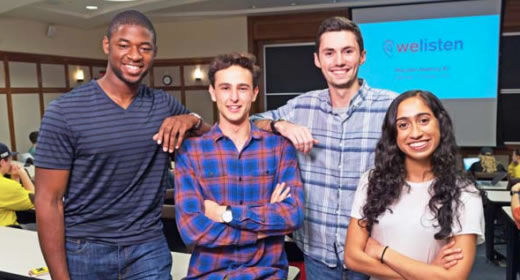
In the winter of 2016, Gabriel Lerner (BA '18)—a lanky, fast-talking, liberal U-M sophomore from Bethesda, MD—won a highly competitive internship with the White House Office of Presidential Correspondence. His job? To read constituent letters.
"Those letters were hard; they were heart wrenching." Lerner says, looking down. "Not a lot of people write letters these days—and when they do, they have something to say."
Many of the letters, he says, were about grave social and economic concerns—persistent unemployment, homelessness, the treatment of veterans, the opioid crisis, and more. Others were about mass shooting that had claimed nearly a dozen lives in Florida, Michigan, and Kansas.
The rest? They were about the President.
President Obama was beginning his last year in office and people across the country were writing to share their views. "Some praised the president and his policies." say Lerner. "Others were critical, sometimes with racist undertones, of the way his policies were changing the country—in their eyes, for the worse."
Lerner, now a senior working on his bachelor's degree in public policy at the Ford School, says the chasm between those views was striking—"It seemed like they were describing two different people"—and it was troubling, as well. "The letters gave wholly different interpretations of what was going on in America—reflecting the echo chambers people were writing from."
Some of the letters weren't well-written. A few were written by people who were clearly struggling with mental illness. But all were important to the staff, and to Lerner. "I didn't really understand what public service meant until I read those letters," he says. "It became clear that that's why government exists—to understand and address those concerns."
Returning to the University of Michigan, and starting his first semester at the Ford School, Lerner readily admits that America's political polarization didn't feel like the most urgent concern he'd read about in those letters. But after the Presidential election, everything changed.

In the days after the election, Lerner and his friends were confused by the results. Lerner reached out to conservative friends to talk about what they saw in the President-elect. But when he looked around the university, he saw students, divided down party lines, "talking past each other, with little interest in seeking to understand the concerns that had led so many Americans to vote for Trump." From the letters Lerner had read during his internship, it seemed that some of those concerns were legitimate.
A few of Lerner's friends shared his worries about political polarization, as well as his curiosity about the views of those who had grown up in communities unlike their own. Among them was Sonia Thosar, an industrial engineering student with a minor in business. Thosar, who also grew up in a relatively homogeneous community, says she found the campus environment "frustratingly devoid of productive, face-to-face dialogue."
Together, Lerner and Thosar decided to launch a new student organization, "WeListen," that would work to foster dialogue through small-group conversations between progressive and conservative students. "We didn’t want students to have to change their views," says Lerner. "Our goal was discourse."
They soon assembled a politically diverse executive board with Republican and Democratic co-presidents, five liberals, an independent, and four conservatives. Initially, Lerner says he and Thosar thought it might be a challenge on a left-leaning campus to find conservative students who would be interested, but that wasn’t the case. "I think everyone on our board is incredibly invested," says Lerner. "But there’s a certain fire for our politically conservative students because they feel this pervasive divisiveness."
They decided to focus their first conversation, held at the Ford School, on a serious concern for students on college campuses across the nation: The Dream Act. They made flyers and posted them across campus. They talked to their friends, and to the leaders of a range of Michigan student organizations including Young Americans for Freedom, the College Republicans, and the College Democrats. And at 6:00 pm on September 24, two dozen students assembled on the first floor of Weill Hall.
As students walked in, they filled out a short survey identifying their views—from liberal to conservative—on a ten-point scale. Lerner and Thosar shared their vision for the organization, and their hopes for the conversation. Other board members introduced the facts and the liberal and conservative views on them. Then students were separated into small, ideologically diverse groups.
For ten minutes, those groups talked about their hometowns, their favorite restaurants, their plans for the weekend, the latest game—anything but politics. Then they received a handout, with questions to launch their discussion, a set of facts that conservative and progressive student leaders agreed on, and simple guidelines for the conversation: "Be kind." "Be respectful." "Be present." "Monitor your airtime."
And the discussions began.
At the start of those discussions, WeListen organizers worried groups might explode or students might storm out angry. But that didn’t happen, says Lerner.
When the groups reconvened to share their experience, they said conversations had been good. Interestingly, says Lerner, there was a good deal of agreement between liberal and conservative students on the morality of allowing DREAMers to remain in the U.S.
People talked and listened. People agreed and disagreed. Most importantly, he says, people learned—not just about some of the valid points the opposing political party offered, but also about where those views and values came from, and how they’d evolved over time
Below is a formatted version of this article from State & Hill, the magazine of the Ford School. View the entire Fall 2017 State & Hill.